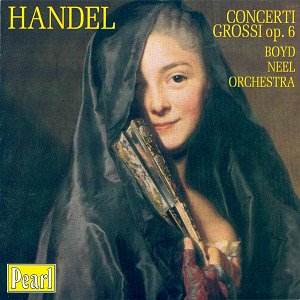Boyd Neel was closely associated with Handelís Concerti
Grossi op 6. This first traversal, recorded between 1936 and 1938 and
issued piecemeal by Decca was followed by a set made toward the end
of the 78 era, between 1950 and 1953. First issued on 78s it was subsequently
collected on LP in 1955 and is a really splendid achievement. For the
earlier set, the subject of this release, Neelís stalwart young soloists
make a fine showing. The imaginative and audible harpsichord continuo
soloist Ė contrast with the near inaudible Horszowski on the Busch set
of Op 6 on Pearl Gemm CD 9296 review Ė
is Arnold Goldsborough and violinists include Frederick Grinke, David
Martin and Louis Willoughby whilst cellists include James Whitehead
and Peter Bevan.
In Op 6 No 1 Neel is much slower and more emphatic
than Busch; as the movement develops Neel is also heavier in texture
and weight of string tone as well as being less athletically expressive.
Many of these points of contrast apply throughout the set though itís
not universally the case that Neelís tempi are slower than Buschís Ė
sometimes itís very much the other way around. There is not always,
however, consistency of tempo-related decision-making in evidence and
as a result both can sound unidiomatic to our ears Ė not that thatís
necessarily the point. Expressive indulgence toward slow movements results
sometimes in congealing tempi Ė combined with the tonal weight of the
Neel orchestra this could lead to the Larghetto of the G Minor lasting
six minutes, even then, I suspect, an unsustainably slow tempo, especially
related to the surrounding movements.
There is nevertheless much to savour and admire in
these pioneering performances. They stand at a point where understanding
of performance practice had yet to be transformed by developments in
technique. But no one should underestimate them Ė or indeed Neelís later,
more perfectly realized set.
Jonathan Woolf


